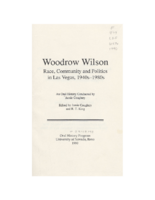Search the Special Collections and Archives Portal
Search Results

Transcript of interview with Jarmilla McMillan-Arnold by Claytee D. White, October 7, 2010
Date
Archival Collection
Description
Jarmilla McMillan-Arnold’s father, Dr. James B. McMillan, was the first black dentist in the state of Nevada. Dr. McMillan’s colleagues consisted of Dr. West, the first black medical doctor in the state, and Dr. Ice, the first black surgeon in Nevada. This interview highlights and archives the solid foundation upon which Nevada’s black community was built. Jarmilla recalls early memories of growing up as the daughter of Las Vegas NAACP president Dr. McMillan. She was born in Detroit, Michigan, to a Caucasian and Indian mother who was a professional dancer. Jarmilla’s parents separated when she was very young and as a result she was raised by her paternal grandmother who owned a restaurant in Pontiac, Michigan. Jarmilla describes her grandmother as being well-known and highly regarded in the community where she maintained her business. Jarmilla attended Catholic schools in Detroit, Pontiac, and Las Vegas. Having moved to Las Vegas with her father, Jarmilla’s narrative offers keen insigh
Text

Photograph of Marcia Washington and her children at Dave Washington's firefighter graduation, 1974
Date
Archival Collection
Description
Black and white photograph of Marcia Washington and her children at Dave Washington's firefighter graduation in 1974.
Image

Transcript from interview with Helen Anderson and Karen Walker by Claytee White and Barbara Tabach, February 21, 2014
Date
Archival Collection
Description
Helen Anderson came to Las Vegas in 1962 from Arkansas, and had her daughter, Karen, in 1967. The pair discusses the family business, Hamburger Heaven, and other businesses on Jackson Street and the Westside. They also talk about hte changes in the neighborhood and their work with the West Las Vegas Citizens for Hope group, and Karen's family services business.
Text
Clifford R. Clayton oral history interview
Identifier
Abstract
Oral history interview with Clifford R. Clayton conducted by Mechia Sydnor on November 11, 2014 for the African Americans in Las Vegas: a Collaborative Oral History Project. Clayton begins the interview talking about his childhood in Virginia, and his subsequent move to Las Vegas, Nevada in 1960 in order to pursue a career in the military at Nellis Air Force Base. He then discusses working on the Strip in Las Vegas, as well as the influence of organized crime on casino operations. He then details the desegregation movement in Las Vegas throughout the 1960s and 1970s, as well as the notable leaders in the community. He also describes the night life in West Las Vegas, on the Strip, and on Fremont Street.
Archival Collection
Alice Key oral history interview
Identifier
Abstract
Oral history interview with Alice Key conducted by Claytee D. White, with Joyce Moore and two unidentified individuals on November 11, 2004 for the African Americans in Las Vegas: A Collaborative Oral History Project. In this informal interview, Key talks about her early education, sharing anecdotes along with more serious comments. She continues talking about her early activism, beginning with housing discrimination in Los Angeles, California, the work of President Lyndon Johnson on equal rights, her work on the Clark County Nevada Economic Opportunity Board, and the issue of hiring Black front-of-house employees at the casinos and hotels. She continues chatting about families who own or owned casinos in Las Vegas, different church leaders in the city, and ends talking about early Black entertainers, including Dorothy Dandridge and the Barry Brothers and her own experiences as a dancer.
Archival Collection
Ricky Lee Towers oral history interviews
Identifier
Abstract
Oral history interviews with Ricky Lee Towers conducted by Claytee D. White on May 02, 2017 and May, 24 2017 for the African Americans in Las Vegas: a Collaborative Oral History Project. In the first interview, Towers discusses his upbringing in Las Vegas, Nevada and growing up in the Westside. He describes businesses on Jackson Street, the opening of the Moulin Rouge, and his experience as an African American card dealer. Towers talks about organized crime influences in the gaming industry, and the decrease of business on the Westside. In the second interview, Towers discusses the redevelopment of the Historic Westside community.
Archival Collection
Audio recording clip from interview with Sonny Thomas by Barbara Tabach, February 28, 2013
Date
Archival Collection
Description
Part of an inverview with Sonny Thomas conducted by Barbara Tabach, February 28, 2013. Thomas describes job options when he arrived in Las Vegas in 1959.
Sound

Transcript of interview with Woodrow Wilson by Jamie Coughtry, 1989
Date
Description
Interview with Woodrow Wilson conducted by Jamie Coughtry in 1989. Born in a Mississippi sawmill town in 1915 to a family that ran a boarding house, Wilson completed high school at a private boarding school and attended two years of junior college before the declining economy forced him into the Civilian Conservation Corps to work as a cook and baker. Migrating west in 1940, Wilson soon settled in Las Vegas, Nevada, where he worked for Basic Magnesium, Inc. He became a prominent Westside community activist, founding a federal credit union and serving as president of the Las Vegas NAACP. Wilson worked for over thirty years as a warehouseman for companies that occupied the Basic Magnesium site. In 1966, he was elected to the state assembly, becoming the first black legislator in the history of Nevada, advocating open housing legislation, anti-discrimination regulations, welfare reform, and civil rights.
Text
Brenda and Johnny Williams oral history interviews
Identifier
Abstract
Oral history interviews with Brenda Manlove Williams and Johnny Williams conducted by Claytee D. White on April 18, 2016 and May 03, 2016 for the African Americans in Las Vegas: a Collaborative Oral History Project. In the first interview, Brenda discusses her early life in Nashville, Tennessee and attending Fisk University. She talks about being a member of The Fisk Jubilee Singers and later transferring to Tennessee State University. Brenda recalls moving to Las Vegas, Nevada in 1972, her employment at Caesars Palace as a cocktail waitress, and the nightlife entertainment at the time. Lastly, Brenda discusses the social and political divides in the African American community of Las Vegas. In the second interview, Johnny describes being one of the first African American card dealers and pit bosses. He talks about his employment at Caesars Palace and changes in the gaming industry. Lastly, Brenda discusses her employment with Regional Transportation Commission of Southern Nevada (RTC).
Archival Collection
